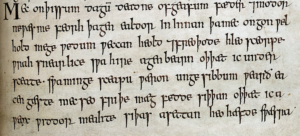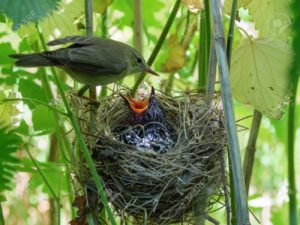Having recently translated Riddle 9 from the Exeter Book (Exeter Cathedral Library MS 3501) in my recent blog on esotericism in a sequence of Old English riddles (“Encoded References in Exeter Book Bird-Riddles“), I have decided to add my translation and recitation of this poetic enigma for our ongoing medieval poetry translation and recitation project. I accept the Old English solution geac “cuckoo” as the poem’s solution based on parallel descriptions of the bird’s experiences from its abandonment—to fostering—and finally betrayal of its host family found in Pliny’s Naturalis Historia X.xi-26-27, which describes the treacherous cuckoo (cuculus) in virtually identical terms.

Old English Riddle 9 (solution: geac):
Mec on þissum dagum deadne ofgeafun
fæder ond modor; ne wæs me feorh þa gen,
ealdor in innan. þa mec an ongon,
welhold mege, wedum þeccan,
heold ond freoþode, hleosceorpe wrah
swa arlice swa hire agen bearn,
oþþæt ic under sceate, swa min gesceapu wæron,
ungesibbum wearð eacen gæste.
Mec seo friþe mæg fedde siþþan,
oþþæt ic aweox, widdor meahte
siþas asettan. Heo hæfde swæsra þy læs
suna ond dohtra, þy heo swa dyde.

“Exeter Book Cuckoo-Riddle:” A Modern English Translation by Richard Fahey:
“In these days, father and mother gave me up for dead. There was no life yet in me, no spirit within. Then one well-meaning kinsman began to wake me in my garment, held and sheltered me, wrapped me in protective-gear so tenderly as her own child, until I, under her cover, became enlarged in spirit among my non-siblings as was my destiny. Afterward, that protective kinswoman fed me until I grew up, and could make wider journeys. She had fewer of her own sons and daughters because she did so.”
Richard Fahey
PhD in English
University of Notre Dame
